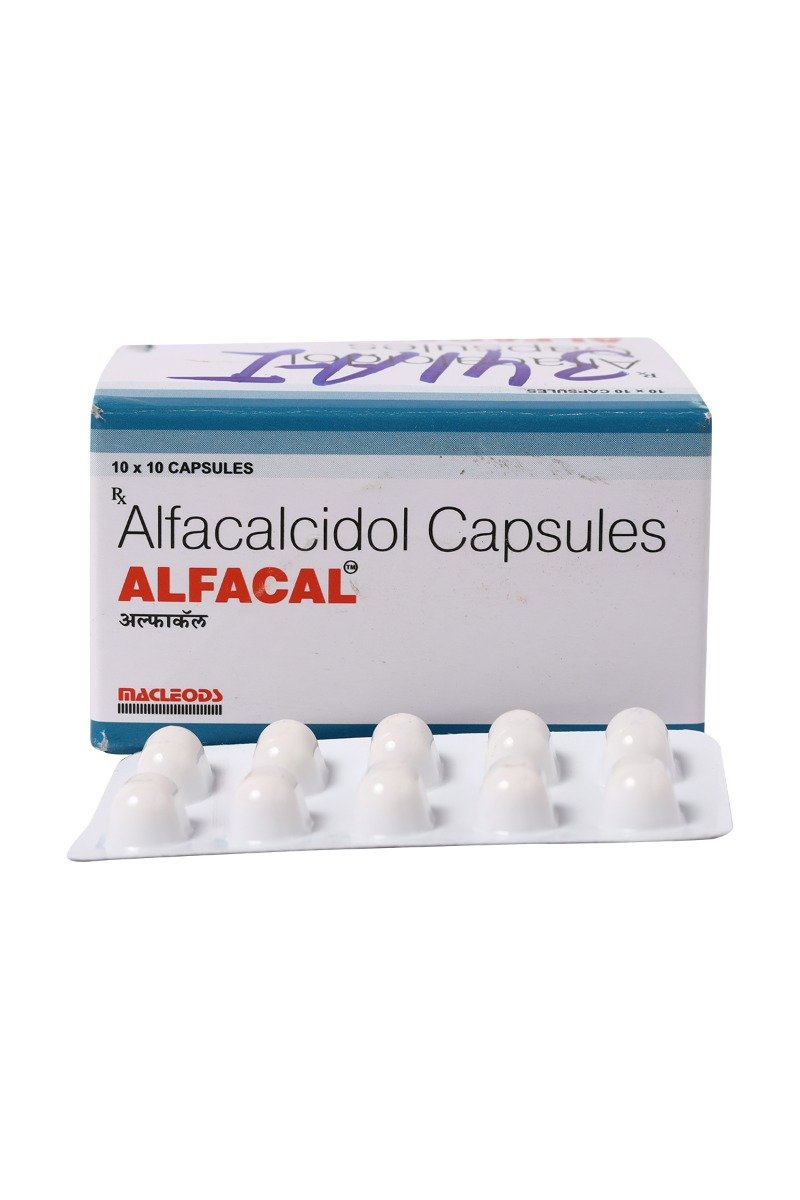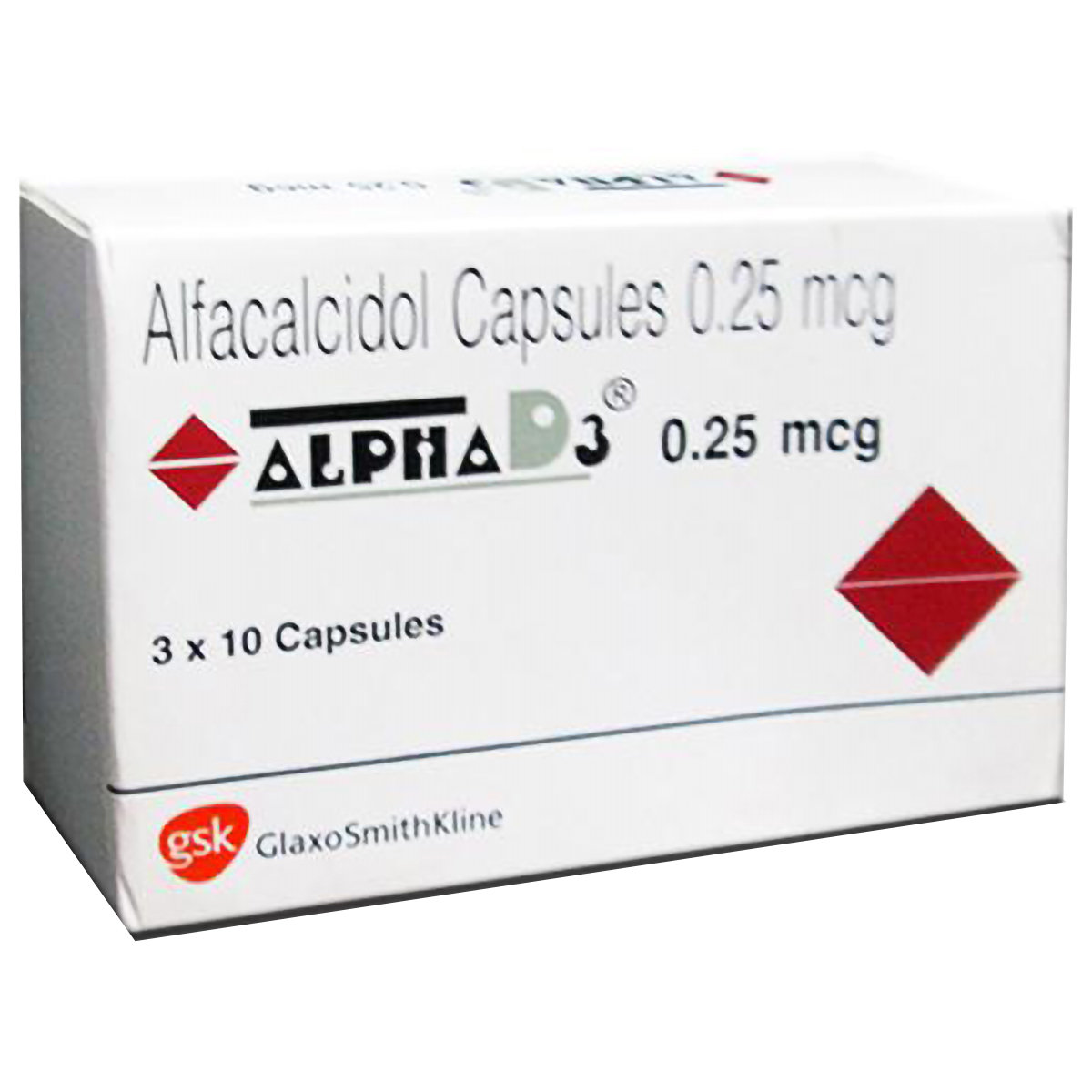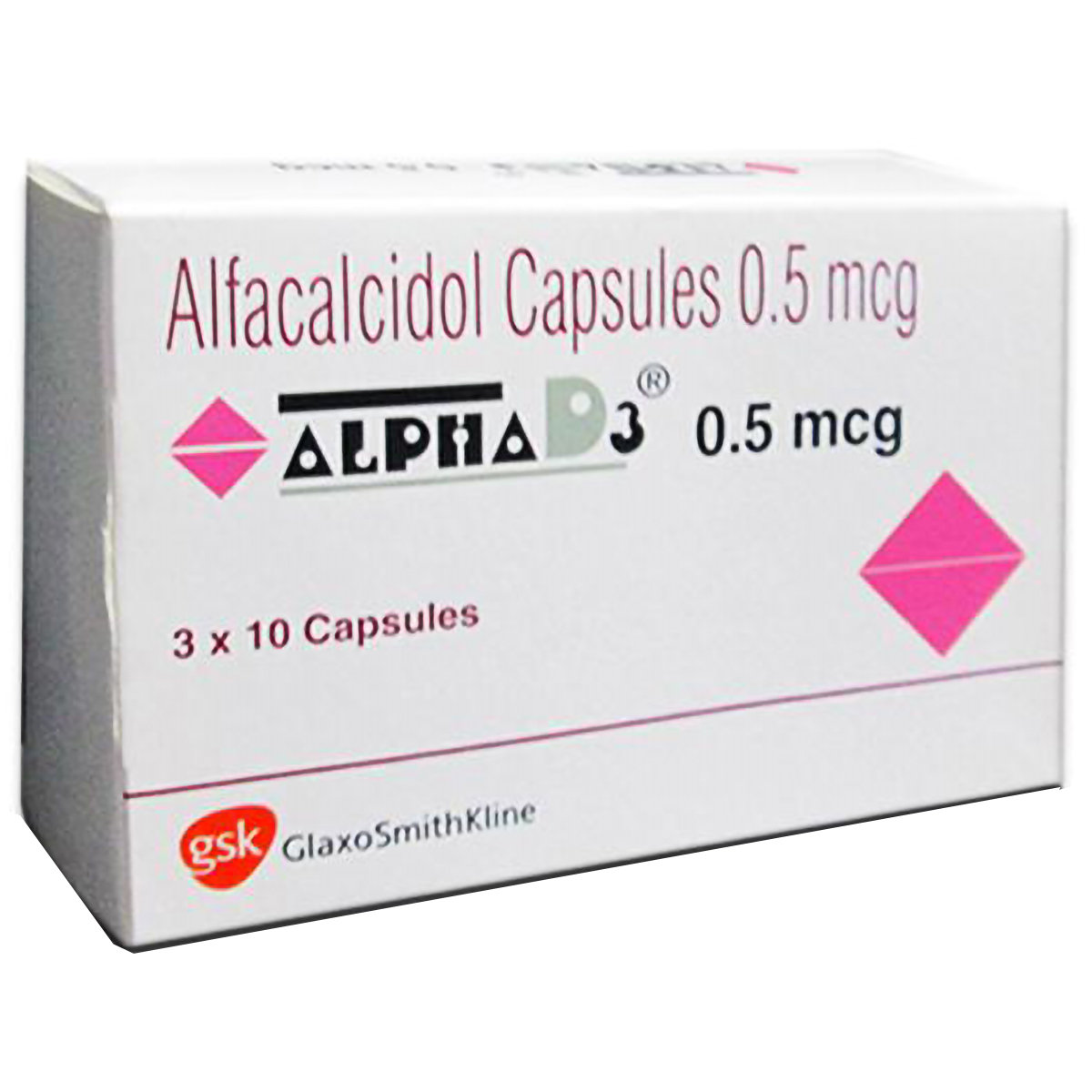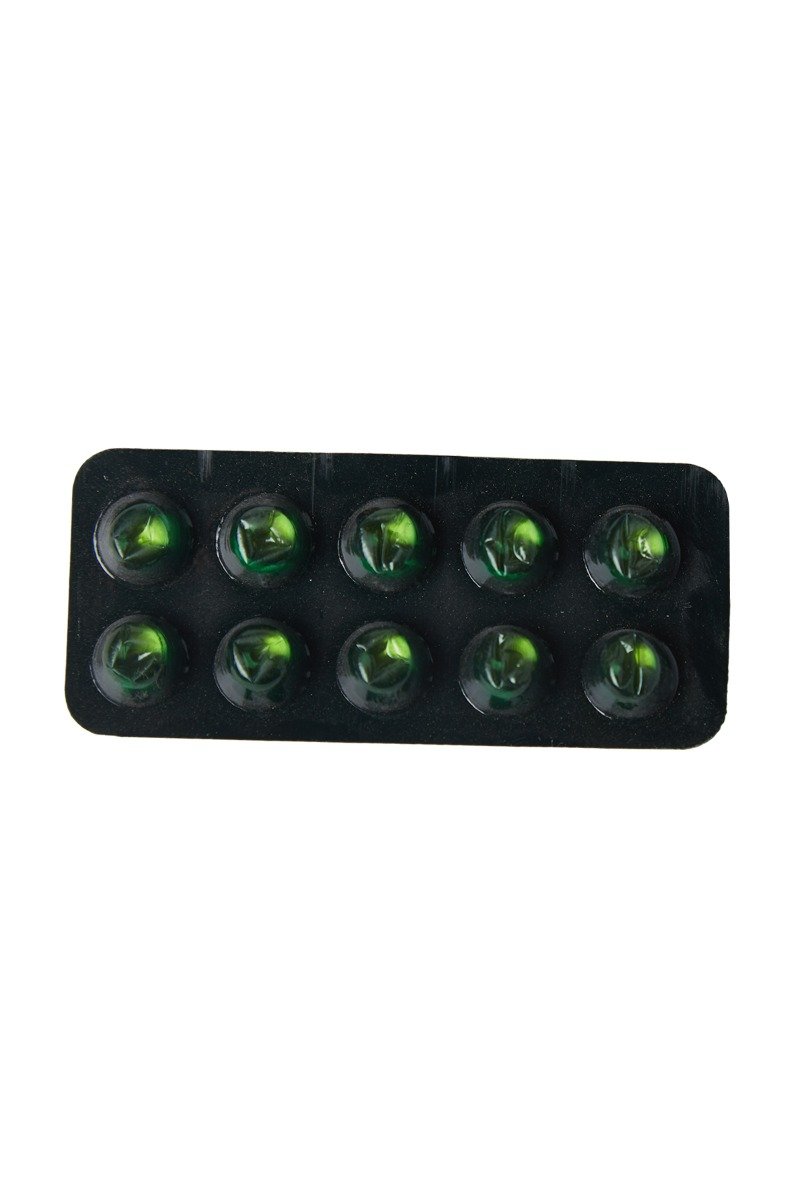Alfacalcidol
About Alfacalcidol
Alfacalcidol is primarily used to treat low blood calcium and phosphate levels. Alfacalcidol effectively treats Vitamin D deficiency, renal osteodystrophy (changes in bone caused by kidney failure), hyperparathyroidism (parathyroid glands make high levels of calcium in the body), hypoparathyroidism (parathyroid glands make low levels of calcium in the body), hypocalcaemia (low levels of calcium), and rickets or osteomalacia (softening or deforming of bones due to lack of calcium). Vitamin D deficiency occurs when your body has low Vitamin D levels and is caused by inadequate nutrition, intestinal malabsorption, or lack of exposure to sunlight.
Alfacalcidol contains 'Alfacalcidol,' which is an analogue of Vitamin D. It is a nutritional supplement activated by liver enzymes after intake. Alfacalcidol is further converted into the active form of vitamin D3 (calcitriol) and works by strengthening the bones by increasing the calcium and phosphate levels in the blood. Calcium and phosphate are essential substances for forming healthy bones and teeth.
Your doctor will decide the dosage based on your medical condition. In some cases, it may cause side effects such as weakness, fatigue, sleepiness, headache, loss of appetite, dry mouth, a metallic taste, nausea, and vomiting. Most of these side effects of Alfacalcidol do not require medical attention and gradually resolve over time. However, if these side effects persist longer, please consult your doctor.
Please tell your doctor if you have hypercalcemia (high calcium levels), hypervitaminosis D (high vitamin D levels), and malabsorption syndrome (difficulty absorbing nutrients from food). Brief your medical history if you have any heart/kidney/liver/blood vessel diseases, sarcoidosis (growth of inflammatory cells in different parts of the body), or kidney stones. Pregnant or breastfeeding women should consult their doctor before taking Alfacalcidol. Alfacalcidol is safe to use in children when advised by the doctor.
Uses of Alfacalcidol
Vitamin D Deficiency: Alfacalcidol helps replenish vitamin D levels by converting to calcitriol (Vitamin D3) and enhancing calcium absorption.
Hypocalcaemia: Alfacalcidol helps raise blood calcium levels by stimulating calcium absorption from the intestine and reabsorption from the bones and kidneys.
Osteomalacia (in adults) or Rickets (in children): Alfacalcidol helps strengthen bones by improving calcium and phosphate absorption and promoting bone mineralisation (deposition of minerals in bone tissue).
Hyperparathyroidism: Alfacalcidol helps suppress excess parathyroid hormone (PTH) levels, which can cause bones to weaken.
Hypoparathyroidism: Alfacalcidol compensates for low PTH levels by maintaining calcium and phosphate balance in the body.
Renal Osteodystrophy: Alfacalcidol helps manage this condition by regulating calcium, phosphate, and parathyroid hormone (PTH) levels, thereby improving bone quality and reducing fractures and pain.
Medicinal Benefits
Alfacalcidol is used to treat low blood calcium and phosphate levels. It contains Alfacalcidol, a vitamin D analogue. It is used to treat vitamin D deficiency, renal osteodystrophy, hyperparathyroidism, hypoparathyroidism, hypocalcaemia, and rickets or osteomalacia. Liver enzymes activate Alfacalcidol after intake, which is further converted into the active form of vitamin D3 (calcitriol). It works by strengthening the bones by increasing the calcium and phosphate levels in the blood.
Directions for Use
- Alfacalcidol should be taken with food for better absorption.
- Your doctor will recommend the appropriate dose and duration of this medication based on your medical condition.
- Swallow Alfacalcidol as a whole with a glass of water
- Do not crush, chew, break, or open it.
Storage
Side Effects of Alfacalcidol
- Weakness
- Fatigue
- Sleepiness
- Headache
- Loss of appetite
- Dry mouth
- Metallic taste
- Nausea
- Vomiting
Drug Warnings
Let your doctor know if you are allergic to Alfacalcidol or its inactive components. Alfacalcidol is not recommended if you have hypercalcemia (high calcium levels), hypervitaminosis D (high vitamin D levels), and malabsorption syndrome (difficulty absorbing nutrition from food). Brief your medical history if you have any heart/kidney/liver/blood vessel diseases, sarcoidosis (growth of inflammatory cells in different parts of the body), and kidney stones. Higher doses of Vitamin D than the recommended daily dose should be used in pregnant women only when advised by the doctor. Alfacalcidol is excreted into the breast milk; hence, consult your doctor before taking Alfacalcidol if you are a breastfeeding mother. Drinking alcohol can affect calcium absorption; therefore, it is advised to limit alcohol intake while using Alfacalcidol. Alfacalcidol is safe to use in children only when advised by the doctor.
Drug Interactions
Drug-Drug Interaction: Alfacalcidol may interact with other vitamin D supplements (Calcipotriene), antacids (that contain Aluminium), heart-related drugs (digoxin), blood pressure medicines (Diltiazem, verapamil), and water pills (chlorothiazide, hydrochlorothiazide, indapamide, metolazone, and chlorthalidone).
Drug-Food Interaction: Avoid or reduce the intake of caffeine, soft drinks and alcohol that inhibit calcium absorption.
Drug-Disease Interaction: Alfacalcidol is contraindicated in hypercalcaemia, hypervitaminosis D, malabsorption syndrome, Vitamin D toxicity, heart/kidney/liver/blood vessel diseases, kidney stones, sarcoidosis, and diabetes.
Drug-Drug Interactions Checker List:
Safety Advice

Alcohol
cautionDrinking alcohol can affect calcium absorption; hence, it is advised to limit alcohol intake while using Alfacalcidol.

Pregnancy
cautionDuring pregnancy, use higher doses of Alfacalcidol than the daily dietary allowance only when advised by the doctor. Your doctor will weigh the potential risks and benefits before recommending Alfacalcidol.

Breast Feeding
cautionConsult your doctor before taking Alfacalcidol if you are breastfeeding. Alfacalcidol can be passed into breast milk. If Alfacalcidol is used during breastfeeding, please monitor the serum calcium levels of the mother and the infant.

Driving
cautionIf you experience any dizziness while using Alfacalcidol, do not drive or operate machinery. Please consult your doctor if you experience any dizziness.

Liver
cautionLet your doctor know if you have any history of liver disease before taking Alfacalcidol. Hepatic impairment or liver disease can alter the metabolic and therapeutic activity of certain forms of Vitamin D.

Kidney
cautionIt is advised to seek a doctor's advice before starting Alfacalcidol if you have kidney diseases like kidney stones or are undergoing dialysis.

Children
consult your doctorThe doctor will decide the dosage of Alfacalcidol based on the child's age and weight.
Habit Forming
Diet & Lifestyle Advise
- Include dairy products like milk, yoghurt, cheese, or milk-based custard in your diet.
- Eat daily a serving of broccoli, cabbage, bok choy, spinach, and other green leafy vegetables.
- Include the best dietary sources of vitamin D, such as fish liver oils and vitamin D-fortified milk.
- Snack on calcium-rich nuts like Brazil nuts or almonds.
- Sprinkle sesame seeds over your food, vegetables, and salads. Sesame seeds are high in calcium.
- Avoid or reduce the intake of caffeine, soft drinks, and alcohol that inhibit calcium absorption.
- Replace the meat with tofu or tempeh for an added source of calcium in your diet.
Special Advise
- Clinical monitoring of serum electrolyte concentrations and cardiac function is recommended.
Patients Concern
Disease/Condition Glossary
Vitamin D deficiency: When a person cannot get enough Vitamin D through food and exposure to sunlight, it leads to vitamin D deficiency. It often leads to thin, brittle or misshapen bones.
Renal Osteodystrophy: It is a bone disease that occurs when the kidneys fail to maintain the blood's calcium and phosphorus levels. It typically occurs in individuals with kidney disease and patients undergoing dialysis treatment.
Hypocalcaemia: It is a condition caused by low levels of calcium in the blood. The lack of vitamin D can cause hypocalcaemia.
Osteomalacia/Rickets: A disease caused by softening and weakening of bones in children due to inadequate vitamin D.
Hypoparathyroidism: It is a disease characterised by low levels of parathyroid hormone. This can cause low calcium levels and trigger tetany (muscle cramps, spasms or tremors).
Hyperparathyroidism: It is a condition in which one or more of your parathyroid glands become overactive and release high parathyroid hormone levels. This condition leads to hypercalcemia (high levels of calcium in the blood).
FAQs
Alfacalcidol is used to treat low blood calcium and phosphate levels. It effectively treats Vitamin D deficiency, renal osteodystrophy (changes in bone caused by kidney failure), hyperparathyroidism (parathyroid glands make high levels of calcium in the body), hypoparathyroidism (parathyroid glands make low levels of calcium in the body), hypocalcaemia (low levels of calcium), and rickets or osteomalacia (softening or deforming of bones due to lack of calcium).
Alfacalcidol is a dietary supplement that treats low levels of calcium and phosphate in the blood. It consists of Alfacalcidol, an analogue of Vitamin D. When you do not get enough Vitamin D from food sources and sunlight exposure, Alfacalcidol helps balance those low levels.
If you miss a dose, take it as soon as you remember. However, if it is time for the next scheduled dose, skip the missed dose and follow your usual dosage.
Milk is considered to be the best source of calcium. You can take Alfacalcidol with milk.
Alfacalcidol can cause kidney stones due to excessive calcium deposition when used for an extended period. Please consult your doctor before taking Alfacalcidol as a daily supplement if you have any kidney problems or a history of kidney stones.
Alfacalcidol is used to increase low levels of calcium in the body. Hence, it is not advised to use Alfacalcidol during hypercalcaemia, since it causes the overdose of calcium, leading to kidney stones and other effects.
Alfacalcidol should be used with caution if you have hypercalcaemia (high calcium levels), hypervitaminosis D (high vitamin D levels), malabsorption syndrome (difficulty absorbing nutrition from food), heart/kidney/liver/blood vessel diseases, diabetes, phenylketonuria, and kidney stones. Please consult your doctor before starting Alfacalcidol if you have any history of these diseases.
Alfacalcidol may increase the absorption of Aluminium in antacids. Hence, it is advised to take Alfacalcidol two hours before, or four hours after taking antacids.

